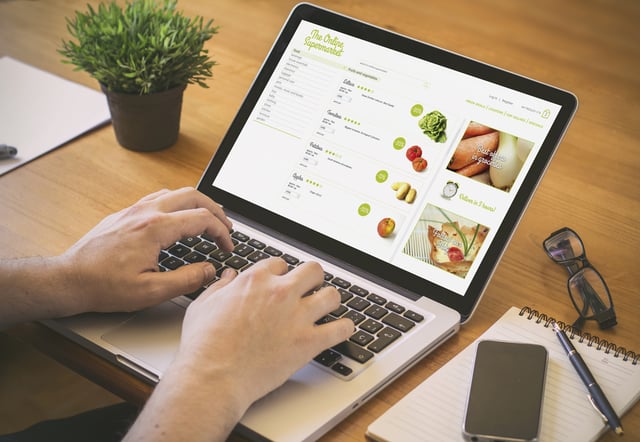Walmart breaks record with Q2 online grocery share
Walmart Inc. is more dominant in the U.S. online grocery market than ever.
According to the "U.S. eGrocery Market Share Report Q2 2024," based on data from the monthly Brick Meets Click/Mercatus grocery shopping survey, Walmart (excluding Sam’s Club) captured 37% of the U.S. online grocery market in the second quarter of 2024, climbing 1.5 percentage points from the same quarter in 2023 to mark its highest share level to date.
In contrast, supermarkets lost 2.5 percentage points during the recent quarter compared to a year ago to finish the second quarter of 2024 with 27.3%. Walmart’s sales share (excluding Sam’s Club) began gaining on supermarkets in early 2022 after the expiration of the expanded child tax credit at the end of 2021 and as overall and food at home inflation was growing faster than wages.
According to Brick Meets Click/Mercatus analysis, this led to dramatic drops in the personal savings rate and rapid growth of outstanding credit card balances while interest rates continued rising.
[READ MORE: Numerator: Walmart captured 21.4% of grocery dollar share during past 12 months]
Meanwhile, Brick Meets Click/Mercatus data indicates Target has made more moderate sales share gains over the last several years, gaining 1.2 percentage points of share from the second quarter of 2021 and finishing the second quarter of 2024 with 7% of online grocery sales.
Brick Meets Click/Mercatus analysis suggests that strong execution in filling pickup orders and a price gap halfway between supermarkets and Walmart likely helped Target’s online grocery performance.
Analysis of mass/supermarket Q2 performance
Overall, the study shows that the mass format captured nearly half of all delivery sales in the second quarter of 2024, driven by Walmart’s nearly eight-percentage point jump in delivery share from the same quarter in 2023.
During the same period, supermarkets went from leading mass in delivery sales share by about one point to trailing by nearly 10 points, although recent promotional pushes by Instacart helped to boost supermarket sales share between the first and second quarters of 2024.
During the same period, supermarkets went from leading mass in delivery sales share by about one point to trailing by nearly 10 points, although recent promotional pushes by Instacart helped to boost supermarket sales share between the first and second quarters of 2024.
In pickup, supermarkets ended the quarter with approximately 28% of the segment’s sales compared to mass, which claimed almost 58%. Mass lost one percentage point of pickup sales share year-over-year, while supermarkets lost more than double (2.1 percentage points). Pickup continues to remain the dominant receiving method for online grocery sales in the U.S. with a 45.5% share, down 1.1 percentage points year-over-year.
The share of supermarket customers who also shopped with mass during the quarter rose 3.7 percentage points, reaching more than 32% with roughly one in five doing so with Walmart. This gain was fueled by increased dual usage within the middle two income groups ($50,000 to $99,000 annual household income and $100,000 - $199,000) while both the lowest ( less than $50,000) and highest-income ($200,000-plus) groups decreased cross-shopping year-over-year.
"Walmart’s reputation for low prices helped to attract households that wanted both the convenience of shopping online and ways to save money in this market," said David Bishop, partner at Brick Meets Click. "The execution of its omnichannel strategy, plus the operational efficiencies aided by incredibly high order demand, has enabled Walmart to consistently deliver the type of experiences that customers expect and to lower its cost to serve online orders at the same time."
The analysis leverages data from the monthly Brick Meets Click/Mercatus grocery shopping survey, an independent research initiative conducted by Brick Meets Click since March 2020, and sponsored by Mercatus.




